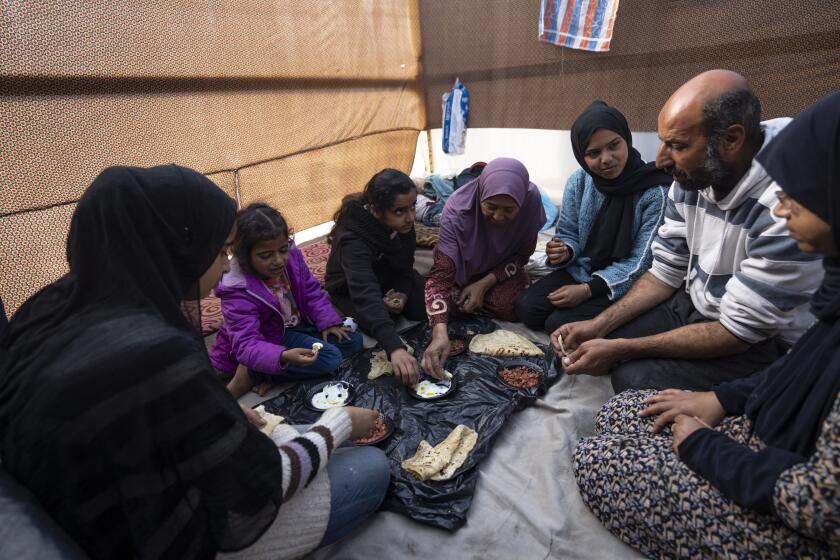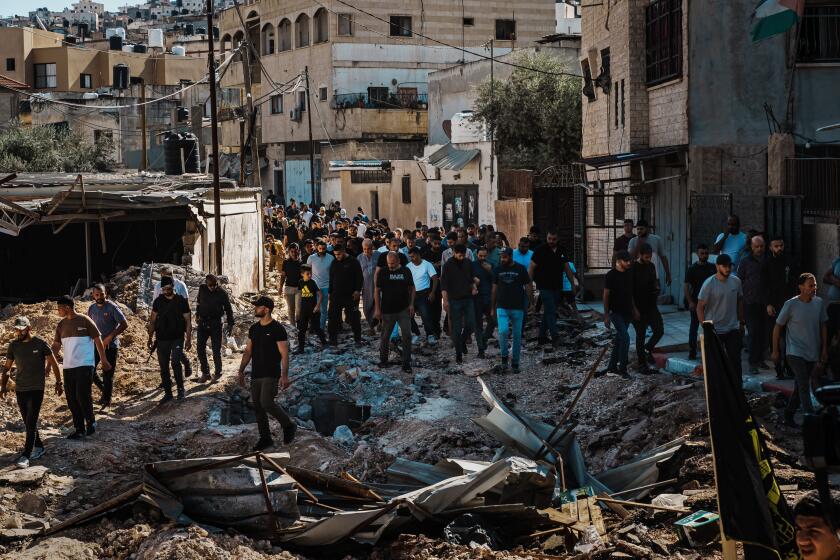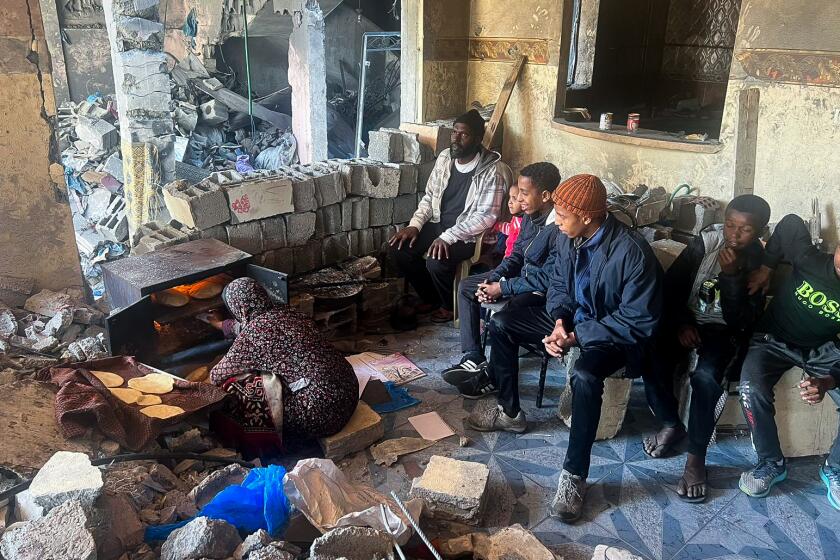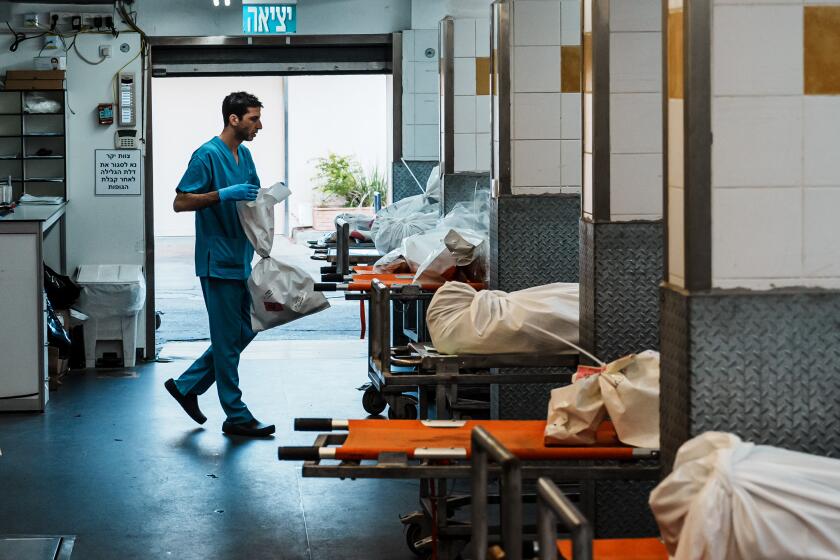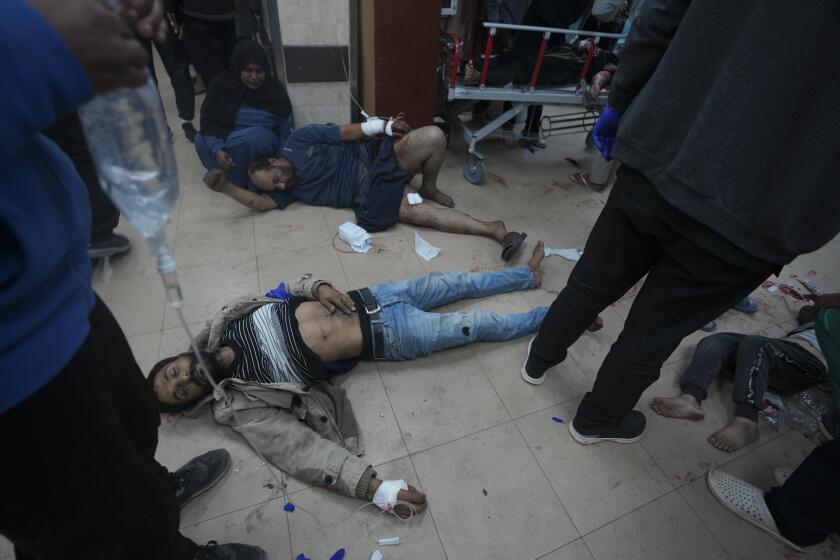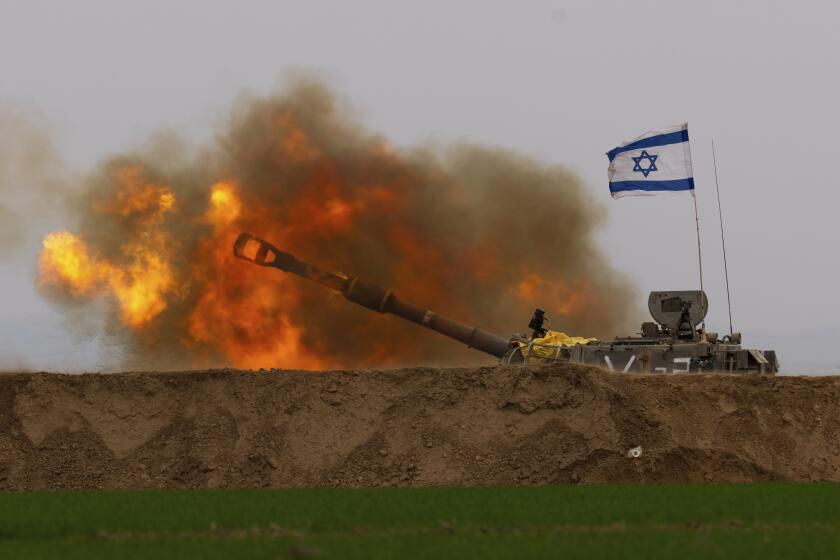U.S. secretary of State rallies Mideast leaders to prepare for Gaza’s postwar future
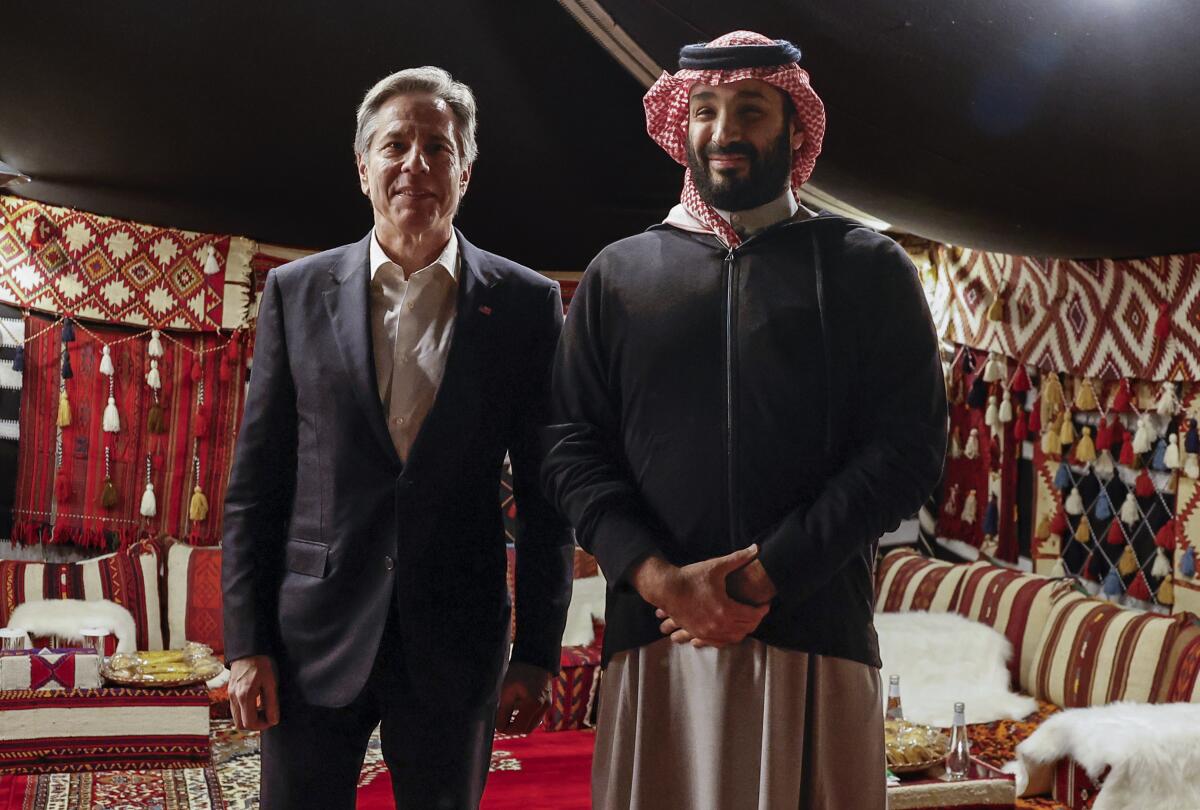
- Share via
AL ULA, Saudi Arabia — U.S. Secretary of State Antony J. Blinken said Monday that four key Arab nations and Turkey have agreed to begin planning for the reconstruction and governance of Gaza once Israel’s war against Hamas ends.
Blinken, who is on an urgent Mideast mission aimed primarily at preventing the conflict from spreading as fears rise of a regional war, said Saudi Arabia, Jordan, Qatar, the United Arab Emirates and Turkey would consider participating in and contributing to “day after” scenarios for the Palestinian territory, which has been devastated by three months of deadly Israeli bombardment.
Those countries had previously resisted U.S. calls for postwar planning to begin, insisting that there must first be a cease-fire and a sharp reduction in the civilian suffering caused by Israel’s military response to Hamas’ deadly Oct. 7 attacks.
On what is his fourth trip to the Mideast since the war began in October, Blinken said those countries were now open to such planning and that each would consider its own involvement in whatever is eventually decided upon.
Palestinians seeking refuge in southern Gaza say every day has become a desperate struggle to find food, water, medicine and working bathrooms.
“Everywhere I went, I found leaders who are determined to prevent the conflict that we’re facing now from spreading, doing everything possible to deter escalation to prevent a widening of the conflict,” Blinken told reporters traveling with him.
Blinken made the comments after meeting Saudi Crown Prince Mohammed bin Salman at the Saudi royal’s winter camp outside the ancient incense-route trading city of Al Ula in western Saudi Arabia. Blinken had earlier visited Turkey, Greece, Jordan, Qatar and the UAE.
The leaders of those countries “agreed to work together and to coordinate our efforts to help Gaza stabilize and recover, to chart a political path forward for the Palestinians and to work toward long-term peace, security and stability in the region as a whole,” Blinken said.
Palestinians in Jenin refugee camp, a center of West Bank resistance, say repeated Israeli raids appear intended to make their city as uninhabitable as Gaza.
He said they “are prepared to make the necessary commitments to make the hard decisions to advance all of these objectives to advance this vision for the region.”
Blinken did not offer specifics on potential contributions. Financial and in-kind support from the UAE and Saudi Arabia could be essential to the success of any plan.
Arab states have been highly critical of Israel’s actions and have eschewed public support for long-term planning, arguing that the fighting must end before such discussions can begin. They have been demanding a cease-fire since mid-October as civilian casualties began to skyrocket.
‘I just don’t know where we’ll go.’ It’s a question Palestinians ask over and over in Gaza as Israel ramps up bombardment after Hamas truce collapsed.
A forensic investigator in Tel Aviv works to reassemble remains of victims of Hamas militants, trying to understand the causes of death and the underlying cruelty.
After meeting Blinken during his visit to Qatar, Foreign Minister Sheikh Mohammed bin Abdulrahman al Thani called for an immediate cease-fire, saying the constant images of death and destruction in Gaza are desensitizing people to the horrors of what is happening.
“This is a big test for our humanity,” he said. “We are looking for a sustainable future. However, the focus is now on stopping the fighting.”
In Amman on Sunday, Jordan’s King Abdullah II “warned of the catastrophic repercussions” of the war in Gaza while calling on the U.S. to press for an immediate cease-fire, a statement from the Royal Court said.
Israel has refused to agree to a cease-fire and the U.S. has instead called for specified temporary “humanitarian pauses” to allow aid to get in and people to get to safety.
Another urgent priority for Blinken is to increase humanitarian assistance to Gaza. In Amman, Blinken toured the World Food Program’s regional coordination warehouse, where trucks were being packed with aid to be delivered to Gaza through both the Rafah and Kerem Shalom crossings.
From Saudi Arabia, Blinken traveled to Israel and he will also visit the West Bank and Egypt before returning to Washington on Wednesday.
The U.S. has been pressing Israel for weeks to let greater amounts of food, water, fuel, medicine and other supplies into Gaza, and the U.N. Security Council passed a resolution on Dec. 22 calling for an immediate increase in deliveries. Three weeks ago, Israel opened its Kerem Shalom crossing, adding a second entry point for aid into Gaza after Rafah.
An Israeli airstrike killed an elite Hezbollah commander in southern Lebanon, the latest in an escalating exchange of fire across the border.
Still, the rate of trucks entering has not risen significantly. In recent days, an average of about 120 trucks a day entered through both crossings, according to U.N. figures, far below the 500 trucks of goods going in daily before the war and far below what aid groups say is needed.
More than half a million people in Gaza are starving because not enough food is entering the territory amid the Israel-Hamas war, the United Nations reports.
Almost the entire population of 2.3 million depends on the trucks coming across the border for their survival. One in 4 Palestinians in Gaza is starving, and the rest face crisis levels of hunger, according to the U.N.
More than 85% of people in Gaza have been driven from their homes by Israeli bombardment and ground offensives. Most live in U.N. shelters crowded beyond their capacity, in tent camps or on the streets.
Blinken’s visit comes as developments in Lebanon, northern Israel, the Red Sea and Iraq have put intense strains on what had been a modestly successful U.S. push to prevent a regional conflagration since Hamas’ October attack, and as international criticism of Israel’s military operation mounts.
More to Read
Sign up for Essential California
The most important California stories and recommendations in your inbox every morning.
You may occasionally receive promotional content from the Los Angeles Times.
